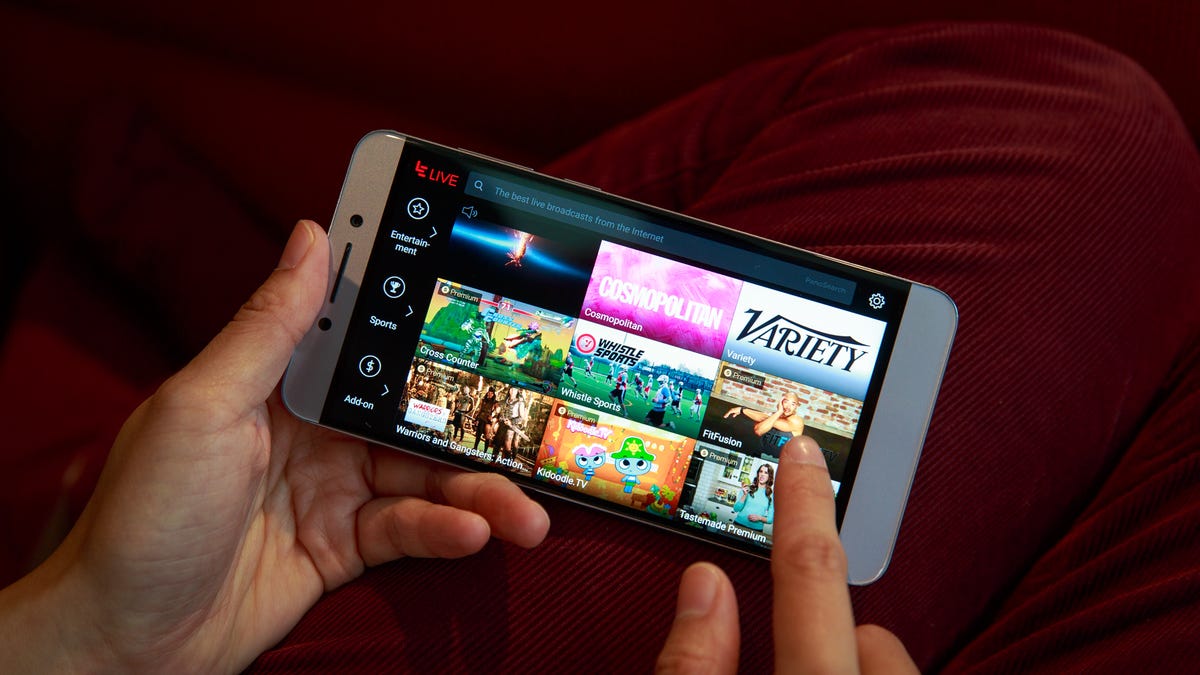Chinese tech giant crashes hard in US overreach
Little-known LeEco cuts 70 percent of its US workforce as its lofty goals couldn't match the reality of a tough market.

It was a chilly January night in Las Vegas as Danny Bowman and I hopped on our LeEco smart bikes in a dim parking lot of the MGM Grand Hotel and Casino.
The chief revenue officer of LeEco -- an enigmatic Chinese company positioned as one part Samsung, one part Netflix and many parts unbridled ambition -- had spent the last 30 minutes up in one of MGM's pricey Skyline suites trying to convince me about the legitimacy of the company's US strategy.
But it was the fifth day of CES 2017, and I just wanted to race.
It just so happened that LeEco had unveiled a smart mountain and road bike at the conference, complete with a 4-inch touchscreen, Wi-Fi, Bluetooth and laser beams (yep, lasers) that shot out of the handlebars. It, of course, ran on Android. Bowman, who regularly biked with his colleagues near LeEco's office in San Jose, California, was more than game. He rode the mountain bike version, while I jumped on the road bike version.
It wasn't even close. Bowman smoked me.
Over the next few months, however, the victories would be harder to come by at LeEco. On Tuesday, the company said it was cutting 325 employees, or 70 percent of the workforce of its US business, due to a lack of funding. Bowman is among the employees leaving, and those smart bikes will never hit the market.
The focus of the LeEco phones was to push programming as its core feature.
The news, which comes just days after Jia Yueting stepped down as the CEO of the publicly listed sister company Leshi, marks a nail in the coffin of the company's ambition to be the next major US consumer electronics player on par with an Apple or Samsung. LeEco's sudden rise and equally quick fall is a testament to the difficulty of appealing to fickle US consumers. It's also a reminder that grand promises to consumers about changing the way they view entertainment mean little if they have no idea who you are.
"They showed a lot of ambition without thinking through how to build a sustainable structure and foundation," said Chris Dong, an analyst at IDC.
LeEco will continue to operate in the US but will focus on the narrower segment of Chinese-speaking households, according to a company spokeswoman.
Red flags from the beginning
In October, LeEco launched its US business with a splashy affair in San Francisco. The company promised to be a mash-up of Apple (phones), Samsung (televisions), Netflix (movies and shows), Paramount (movie studio) and Tesla (a self-driving car). It snagged the 49-acre property from Santa Clara, California, from Yahoo and was set to build a massive innovation hub.
LeEco CEO Jia Yueting promised a lot that he couldn't deliver on.
The pitch was selling high-quality gadgets like TVs and phones at cut-rate prices and making up the difference by offering other services like video subscriptions.
Things got a little weird from the get-go, when Jia ran on stage at that first event and spent 20 minutes on a confusing monologue about the prototype for its self-driving car (which had been damaged in transport). To an increasingly quiet and confused audience, he went into excruciating detail about the whole affair.
It got worse. A month later, Jia shared a six-page memo with employees warning that the company had expanded too fast, calling for an organizational restructuring to eliminate "big-company disease."
Last month, LeEco reportedly delayed its payroll for some US employees. Flashy hires like Todd Pendleton, the man behind Samsung's successful "The Next Big Thing" campaign, had left the company.
LeEco also scrapped its $2 billion deal to buy US TV maker Vizio, citing "regulatory headwinds."
On Saturday, Jia stepped down as CEO of Leshi, but would keep his focus on the unlisted LeEco businesses.
"We are currently on a difficult path," he said in a memo to employees. "Thank you everyone for sticking with us all this time."
LeEco who?
LeEco found out, as many other companies have, that it's difficult to sell products directly to consumers through your website if your name isn't Amazon. Compounding the challenge was the fact that no one had heard of LeEco, so it's not like consumers knew to look for its products.
Beyond the cuts, LeEco will shut down the engineering operations in San Diego, concentrating its team in San Jose. The company hasn't said whether it will sell the property it acquired from Yahoo.
Sadly, the bikes will never get sold.
A LeEco spokeswoman said the company still believes its products are competitive through this year, although there was no comment on whether it would continue to release new gadgets.
Jia's grand vision of LeEco in the US has been scaled down to a niche player. The hope is that LeEco can push televisions that feature the Chinese programming the company already produces or has the rights to broadcast in its home market, which may appeal to Chinese-speaking consumers in the US. In addition to its TVs, LeEco sells the U4 set-top box, which costs $149.99 for two years of access to Chinese programming.
IDC analyst Dong estimates that there are roughly 4 million such households in the country. But even he is skeptical that LeEco can target that niche market, given the specific advertising and distribution needs.
"Even if you cater to smaller portion of the market, you still have to put money into it so they recognize the brand," Dong said.
Originally published May 23 at 10:30 a.m. PT.
Updated May 24 at 7:00 a.m. PT: To include background on the Vizio deal.
Virtual reality 101: CNET tells you everything you need to know about VR.
CNET Magazine: Check out a sample of the stories in CNET's newsstand edition.

